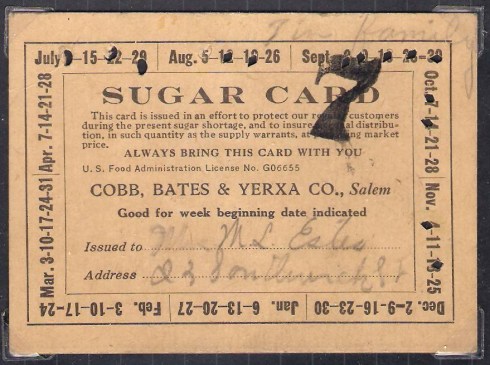As the enormity of loss in the Civil War created Memorial Day, the traumatic experience of World War One, the “Great War”, led to Armistice Day, celebrated in Great Britain and the Commonwealth countries as “Remembrance Day” and in the US as Veterans Day after 1954. Remembrance Day is marked by a two-minute collective silence, at the eleventh hour of the eleventh day of the eleventh month, and the placement of poppies, representing both blood (death) and life in Flanders’ fields.
I can understand why Armistice Day was changed to Veterans’ Day in the United States, as the term “Armistice” specifically refers to World War I and a more general name was needed for the national holiday after World War II and the Korean War. But the wars of the first half of the twentieth century were “total wars” demanding contributions and sacrifice on the part of the entire population, so I think I prefer the even more-inclusive “Remembrance Day”. The posters below, from 1917-1918 and the Library of Congress, illustrate how the home front supported the war front during the Great War.
Eat less, waste nothing, fill in for the boys, buy war bonds and stamps; even children had their part to play:
The Food Will Win the War message/mission must have been a drumbeat, enforced by ration cards like the examples below. The second card is from the impressive archive of local collector and historian Nelson Dionne.
Mr. Dionne also sent along this amazing photographic collage by commercial photographer Leland Tilford of the new draftees of Salem leaving for the war, so determined. Many of these young men would be dead within a few years, either from the conflict itself or from some disease contracted on the field, in the trenches, or in a military hospital. When browsing through the Report of the Commission on Massachusetts’ Part in the World War, Part II: The Gold Star Record of Massachusetts (1929), it was immediately apparent just how many soldiers from Salem (over half the casualties I surveyed) died from an unidentified “disease”, most likely the deadly post-war flu pandemic.
When the soldiers of the Great War returned, if they returned, it was to a grateful nation, parades, and the first national programs for veterans. Unfortunately, the Great War was only the first World War, and as the twentieth century produced more wars and more veterans, Armistice Day evolved into Veterans Day, a day of reflection and remembrance.
Scenes from a post-war world: Department of Labor poster and “Back to the Farm” (with a prostheses) exhibit, 1918-1919 (Library of Congress) and an Armistice Day parade on Tremont Street in Boston, 1929 (Boston Public Library).


















November 11th, 2011 at 9:42 am
A wonderful post. I always so enjoy reading them, and love the old photographs and posters you used . We are commemorating Armistice Day here in Ireland too, as thousands of Irish men lost their lives fighting for the Allies in British regiments, in both World Wars, and many then came back to Ireland after World War 1, and fought against the British in the War Of Independence here in Ireland, and then Irish man against Irish man in the Civil War.
Today we are also celebrating the inauguration of our new President, the ninth President of Ireland today, Michael D. Higgins. have a lovely weekend!.
November 11th, 2011 at 9:49 am
Thank you so much for your comments, Bernadette. It’s amazing to me to think of all the Irish people went through in the early twentieth century alone. I wish you all a respectful Armistice Day and a happy Inauguration Day.
November 11th, 2011 at 9:58 am
So much of the tragedy of the 20th century is a direct result of the Great War, yet it’s largely forgotten in the US. Yours is an excellent post and a wonderful way to remember not only “Rememberance Day,” but World War I.
November 13th, 2011 at 10:23 am
Thanks so much; I totally agree, the First World War left on imprint on much of the twentieth century, which I think is a particularly dark one.
November 13th, 2011 at 10:10 am
I don’t know how you do it — such beautiful, profound and pertinent posts. You had me at In Flanders’ Fields, memorized so long ago.
November 13th, 2011 at 10:22 am
Thank you so much–a lovely compliment.
November 15th, 2011 at 10:34 am
Very touching.
Anyes
XX
November 18th, 2011 at 2:11 pm
Great blog Donna! We have some American WWI sheet music (with great illustrated covers) in the Archives that you’d probably enjoy.
November 20th, 2011 at 2:27 pm
I’ve been blogging for almost a year, Susan, and I haven’t even got to your archive yet, but I’m coming soon!